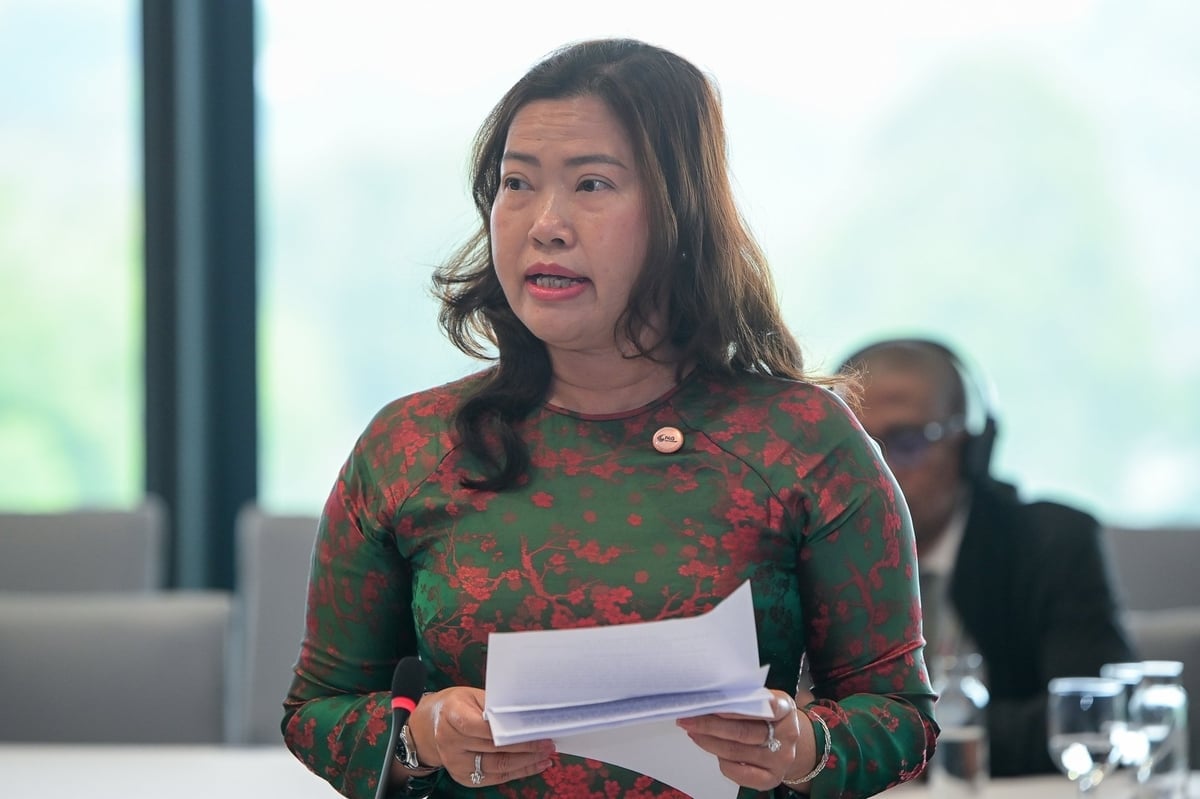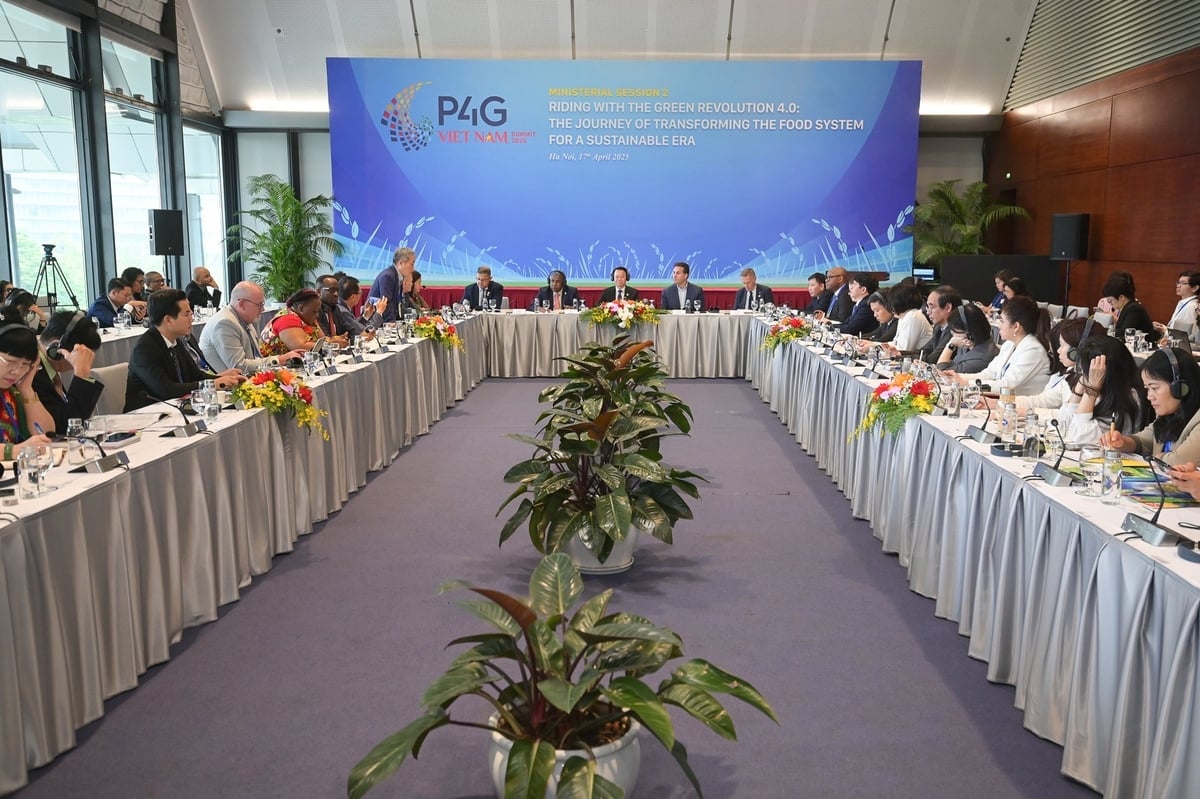December 7, 2025 | 12:48 GMT +7
December 7, 2025 | 12:48 GMT +7
Hotline: 0913.378.918
December 7, 2025 | 12:48 GMT +7
Hotline: 0913.378.918

Mrs. Nguyen Thi Ngoc Diep, Vice Chairwoman of Can Tho City People's Committee. Photo: Tung Dinh.
On the morning of April 17, Mrs. Nguyen Thi Ngoc Diep, Vice Chairwoman of the People's Committee of Can Tho city, was the sole local government representative from Vietnam to speak at the ministerial session titled "Riding with the Green Revolution 4.0: The Journey of Transforming the Food System for a Sustainable Era". The session was part of the P4G Summit and chaired by Minister of Agriculture and Environment Do Duc Duy.
According to Mrs. Diep, in the context of climate change significantly impacting global economic life, investing in green agricultural development is not only an inevitable trend but also a sustainable solution to ensure food security.
In recent years, Can Tho city has made notable progress toward a green economy, particularly by promoting green agriculture to ensure the sustainability of the economic, social, and environmental pillars. At this session, the city shared practical experiences and lessons learned in developing green agriculture to ensure food security.
As the regional center of the Mekong Delta, Can Tho city has a total natural area of approximately 144,000 hectares, including around 113,000 hectares of agricultural land. Of this, over 70,000 hectares are dedicated to rice cultivation, with an annual yield of more than 1.3 million tons of rice. The city also has about 26,000 hectares of fruit orchards, producing over 230,000 tons of various fruits annually.
In recent years, the city's agricultural sector has undergone a strong shift from traditional agricultural production to an agricultural economy, accelerating the application of scientific and technological solutions in alignment with green development trends.
“Green agricultural models are increasingly gaining attention from farmers. Many models are undergoing a transformation toward green and ecological agriculture, aligned with global market trends and aimed at mitigating the impacts of climate change,” said Mrs. Nguyen Thi Ngoc Diep.
Specifically, Can Tho has participated in the Sustainable Agriculture Transformation Project (VnSAT), covering a total area of 38,863 hectares and involving 32,231 farming households. Through this project, farmers have improved their awareness and practices, including reducing seeding rates, adopting Integrated Pest Management (IPM), applying the “4 rights” approach in pesticide use, and reducing chemical fertilizer use, alongside other technological advancements.
These comprehensive solutions and technical procedures have delivered substantial benefits in practice, enhancing productivity and product quality, reducing production costs, and limiting environmental pollution.

Ministerial session titled “Riding with the Green Revolution 4.0: Transforming Food System for a Sustainable Era”, held on the morning of April 17. Photo: Tung Dinh.
According to Ms. Diep, building upon the outcomes of the VnSAT Project, Can Tho city is continuing its efforts by participating in the national project “Sustainable development of one million hectares of specialized high-quality and low-emission rice production associated with green growth of Mekong Delta by 2030”, with an area of 48,000 hectares.
Starting from the summer-autumn crop in 2024, the city launched a 50-hectare pilot model, later scaled up to 170 hectares. All models applied mechanical sowing methods, using 60 kg of seed per hectare, cutting seed usage by 40–50%. Chemical fertilizer use was reduced by over 30%, and 2–3 rounds reduced pesticide application. All models adopted the alternate wetting and drying (AWD) irrigation technique.
As a result, the application of technology significantly reduced water use for irrigation and cut methane emissions. In terms of productivity, yields were 0.3 to 0.7 tons per hectare higher than those from conventional farming methods.
In terms of economic efficiency, production costs decreased by over VND 1 million per hectare, while profits increased by VND 1.3-6.5 million per hectare. In addition, the model promoted the reuse of rice straw by encouraging farmers to grow mushrooms and produce organic fertilizer, generating an extra income of around VND 33 million per hectare over three crop cycles. Greenhouse gas measurements showed a clear reduction in emissions under the new model.
For fruit production, farmers are applying advanced techniques in seed technology, production processes, and automation. Notably, the use of biotechnology and ecological methods for integrated pest management is being expanded. Many fruit-growing areas have also tapped into their potential for eco-tourism development, combining agriculture and tourism.
In the livestock sector, circular economy practices are being adopted at various scales, including waste treatment and reuse of agricultural by-products. Alongside the installation of biogas systems, farmers are being encouraged to collect livestock waste to raise earthworms and black soldier flies, providing a sustainable protein source for animal feed amid rising feed costs. These practices also help convert waste into organic fertilizer, reducing environmental harm.
To successfully integrate into the agricultural economy and transition to a green, low-emission, and sustainable food system, Can Tho city has identified three key solutions:
First, increasing investment in green growth. The city’s agricultural sector will focus on mobilizing social resources, especially from the private sector, to implement green growth goals. Strengthening international cooperation is also essential to attract financial support and facilitate technology transfer, turning agriculture into a model of green, low-carbon, and food-safe development with enhanced competitiveness in global agri-value chains.
Second, advancing science and technology by improving farmers' knowledge and farming techniques through a grassroots extension network. This will empower farmers to take initiative in production based on their own understanding. At the same time, the city will promote the adoption of new scientific and technological innovations in agriculture.
Third, addressing market access for farmers by developing large-scale, standardized, and specialized production zones with strict cultivation protocols. Digital transformation will also be deployed to connect information between production and consumption, enabling full traceability of agricultural products. This is a key factor in defining and positioning a green agriculture model.
* Currency exchange: 1 USD = 25,670 VND (Vietcombank)
Translated by Kieu Chi

(VAN) As of 2025, the ASEAN region has a total of 69 ASEAN Heritage Parks recognized across its 10 member states. Among them, Viet Nam contributes 15 ASEAN Heritage Parks.

(VAN) Yok Don National Park has high biodiversity with numerous endemic plant and animal species, and it is also the only dipterocarp forest ecosystem conservation area in Viet Nam.

(VAN) Viet Nam and Brunei signed two important MOUs on fisheries and IUU, expanding cooperation in agriculture, the environment, and Halal exports, aiming to substantively implement joint projects.

(VAN) The Viet Nam Coconut Association worked with the International Finance Corporation (IFC) and businesses to promote the supply chain, enhance competitiveness, and develop the coconut industry sustainably.
![Hue aims for Net Zero: [2] Pioneering low-emission tourism](https://t.ex-cdn.com/nongnghiepmoitruong.vn/608w/files/huytd/2025/12/04/0633-dulichzero-4-095634_236-161125.jpg)
(VAN) The ancient capital of Hue has developed Net Zero tourism products and models, aiming to reduce carbon emissions and pioneer the establishment of Viet Nam's green tourism destination.

(VAN) C.P. Viet Nam has announced the successful completion of its goal to plant 1.5 million trees during the 2021-2025 period, a key milestone within company's long-term ESG strategy and its roadmap for emission reduction.

(VAN) This is an initiative of MAE aimed at creating a unified coordination mechanism to implement agricultural cooperation programs with developing countries.